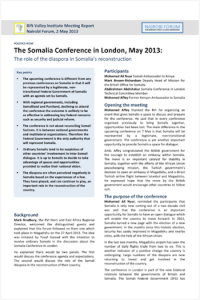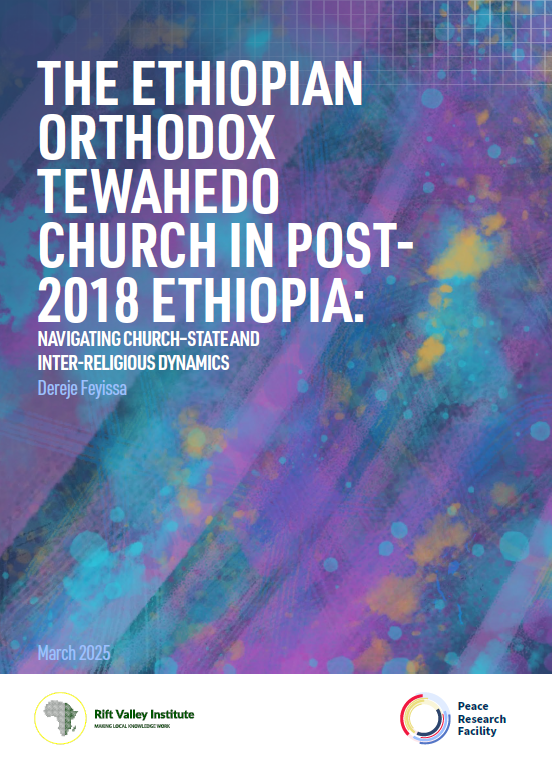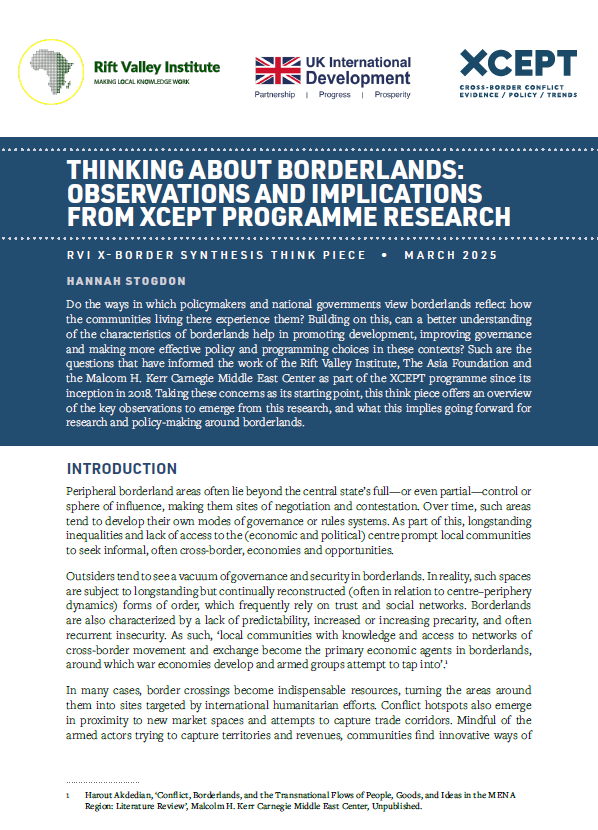Key points
-
The upcoming conference is different from any previous conferences on Somalia in that it will be represented by a legitimate, non-transitional Federal Government of Somalia with an agenda set by Somalis.
-
With regional governments, including Somaliland and Puntland, declining to attend the conference the outcome is unlikely to be as effective in addressing key federal concerns such as security and judicial reform.
-
The conference is not about reconciling Somali factions. It is between national governments and multilateral organizations. Therefore the Federal Government is the only authority that will represent Somalia.
-
Ordinary Somalis tend to be suspicious of other countries’ involvement in inter-Somali dialogue. It is up to Somalis to decide to take advantage of spaces and opportunities provided to realize their national vision.
-
The diaspora are often perceived negatively in Somalia based on the experiences of a few. They have played, and can continue to play, an important role in the reconstruction of the country.
Background
Mark Bradbury, the RVI Horn and East Africa Regional Director, welcomed the distinguished guests and explained that this forum followed on from one which took place in Mogadishu on the 27 April 2013. The idea was initiated by Yusuf Garaad with the intention to involve ordinary Somalis in the discussion about the Somalia Conference in London.
He explained there would be two panels. The first would discuss the conference agenda and expectations. The second would discuss the role of the Somali diaspora in the reconstruction of their country.
Participants
Mohamed Ali Nuur; Somali Ambassador to Kenya
Mark Bryson-Richardson; Deputy Head of Mission for the British Office for Somalia
Abdirahman Abdishakur; Somalia Conference in London Technical Committee Member
Mohamed Affey; Former Kenyan Ambassador to Somalia
Opening the meeting
Mohamed Affey thanked the RVI for organizing an event that gives Somalis a space to discuss and prepare for the conference. He said that in every conference organized previously to bring Somalis together, opportunities had been lost. The main difference in the upcoming conference on 7 May is that Somalia will be represented by a legitimate, non-transitional government. The conference is yet another important opportunity to provide Somalis a space for dialogue.
Amb. Affey congratulated the British government for the courage to establish an embassy within Somalia. The move is an important catalyst for stability in Somalia, together with the efforts of the African Union peacekeeping mission, the Turkish government’s decision to open an embassy in Mogadishu, and a direct Turkish airline flight between Istanbul and Mogadishu. He expressed hope that the move by the British government would encourage other countries to follow suit.
The purpose of the conference
Mohamed Ali Nuur, reminded the participants that Somalia is only now coming out of a two decade civil war and that the conference is an important opportunity for Somalis to have an open dialogue which will enable the country to move forward. In 2012, Somalia turned a new page with the election of a new government. In the months since this historic election, security has vastly improved in Mogadishu and nearby cities, with the help of the African Union.
In the last two months, Mogadishu airport has seen the number of daily flights triple from two to six. This is another indicator of a positive change the country is undergoing. Large numbers of the diaspora are now returning to invest and get involved in the reconstruction of the country.
The conference in London is part of the new bilateral relations between the governments of Britain and Somalia. The Somali Federal Government (SFG) has worked on a detailed national plan to improve security and create stability in the country but needs the support of the international community to implement this plan. On the question of Somalia and Somaliland, both parties formally started talks in Turkey in April this year.
The key priorities for President Hassan Sheikh, and where he needs the British and the rest of the international community’s support, is in the following sectors: judicial system reform, police, and public financial management. Judicial sector reform is vital in improving stability in Somalia, and without a well-trained, properly funded police, Somalia will not be able to improve national security. The civil service is another area where people work for months without being paid, which affects service delivery. The President has particularly emphasized the importance of transparent and accountable financial sector management.
Another area of immediate concern to the current Somali government is how to prevent violence against women. Recent reports list Somalia as one of the worst countries in the world to be a woman. The police have been accused of being some of the perpetrators of this crime and the government has committed to take action to improve the lives of Somali women. It has also promised to take action against the culture of impunity.
Mr. Abdirahman Abdishakur, as an official representative of the SFG to the London Conference, explained why the government requested the conference. He stated that when President Hassan Sheikh recently met with the British government, he asked for help to support Somalia in its plans to improve security and stability. This conference is one of the outcomes following that request.
This second conference is different from the previous conference in London in that the agenda has been set by the SFG. It is co-hosted by British and Somali governments – Somalis are not going to the conference as guests. It is an important opportunity for Somalis to address national priorities and to gain support from the international community. The current SFG has qualified to be a formal partner with the international community and hopes to receive genuine support for its plans and priorities.
Somalia has recently restarted talks with the International Monetary Fund (IMF) and the World Bank. These were facilitated by the British government as part of its support to the Somali government. The focus of the bilateral relationship is not limited to the recent opening of the British Embassy in Mogadishu and the upcoming conference. There are ongoing talks behind the scenes to find the best ways for the two governments to collaborate.
There are also other international actors interested in working with the Somali government to realize its vision. The Japanese and Somali governments are organizing a conference in Tokyo in May, and in September there will be another conference organized by the European Union in Brussels. These are all very important opportunities for Somalis to continue to talk and address their differences, to come to a consensus and move forward.
Mark Bryson-Richardson emphasized that the conference has been organized in partnership. What led us to this conference? Somalia has come out of 20 years of civil war, poverty, and hunger but since last year, things have changed a lot and significant improvements have been made in the areas of security and piracy. The UK’s role is to galvanize international support for the SFG’s vision. Having said that, the improvements made are reversible. It is important for the international community to support these efforts to ensure they are not reversed.
Beyond the UK, the international community is committed to helping the SFG. As mentioned Turkey has held a conference, Japan and the EU are planning conferences. These are all efforts by the international community to come behind and support the SFG’s vision.
Discussion
During the discussions it was emphasized that the international community must honour their commitments – there have been too many conferences with poor outcomes. The British government is aware of the history of Somalia having colonized the north of the country. Now there are an estimated 700,000 British-Somali diaspora. Support from the British government is needed to help Somalis revive the country’s pre-war status.
It was also suggested that the Somali government needs to first have a dialogue with the regional governments (Somaliland and Puntland), who have all declined to attend the London conference. The government needs to earn its legitimacy from the region by involving them in national issues and more importantly, by engaging in a serious dialogue with them. Their support for the federal government, it was suggested, is more important than a conference in London, Istanbul, or Japan.
The real solution will come from within and not from a day’s conference. It was however noted that it will be extremely difficult to achieve the national plans and priorities without the financial and technical support of the international community.
A government representative reiterated that reconciliation is a major part of creating stability in Somalia and to that end, President Hassan Sheikh is constantly in talks with the regional governments. There has not been a public engagement about the second London conference, which is why the RVI was approached to organize the forums in Nairobi and Mogadishu.
Participants were reminded that the current government has only been in power for six months, participants were reminded, and it is not fair to judge it too harshly or compare it to the previous government. It will take a while to restore security and stability in Somalia and it is unrealistic to expect a government to immediately solve the many problems created by a two decade long civil war and a total breakdown of law and order in this time. The SFG, with the support of the British government, is also working on getting aid to Somalia better coordinated, more transparent and efficient. Information on the conference and the Somali government’s national plan and priorities can be found on the web (www.gov.UK/Somaliconference13).
The British government, it was noted, is behind the revival of talks between the Somali government and World Bank and IMF. These are important initiatives. The British might be helping for their own strategic reasons but what happens in Somalia has implications beyond the country. Issues such as terrorism and piracy are global issues and require a global response.
The UK sees an opportunity to help Somalis address these issues and not slide back to civil war. The SFG has given detailed plans to improving key sectors, such as: armed forces, police, the judicial system, and financial management. The international community now has something concrete to work on to help the SFG deliver on these. The UK will be announcing details of its own financial commitments during the conference.
The role of diaspora in reconstruction
The second session of the forum was chaired by Yusuf Garaad and was less formal. Yusuf selected three members of the diaspora from the participants to share their experience since they returned to the region.
Before they shared their experience, Yusuf Garaad explained that as part of his preparation for the event, he asked his Facebook friends and followers what they thought the diaspora have contributed to the reconstruction of Somalia. He received many comments and selected the following: “Diaspora is divided in to three categories. The elderly and retired, who bring neither harm nor benefit for having returned to Somalia. The middle-aged group, who are mostly political event organizers. This group have strong clan and regional loyalty and distribute different flags to recruit their event participants in to their political agenda. The last group are those who were either taken out of the country when they were children or born abroad. This is the group that has the most to offer the country as they often have no clan affiliation and come back with skills and education needed in the country.”
Experiences of three diaspora members
Fartaag is an economist from Canada known for his outspoken stance against corruption in Somalia. He believes the diaspora have not helped the country much. They are themselves divided, he said, and every Somali diaspora community has rival organizations all claiming that they represent the community. If the members of the diaspora returning could offer wisdom to reconcile Somalis, they would have reconciled the Somali communities in the diaspora. While it is acknowledged that the diaspora members send home a huge amount of money to their families and friends, they have not brought the much needed financial or technical expertise. In his experience, those who have returned have done so to enrich themselves while maintaining strong clan loyalty.
Suldaan is a young Somali government official from the UK who returned to Somalia in 2011. Contrary to Fartaag’s experience, he thinks diaspora Somalis have contributed a lot to Somalia’s reconstruction. He is surprised when the diaspora are accused of having lost their culture. Instead, he thinks that many of the returning diaspora have a stronger sense of culture than those who have stayed behind. He noted that the majority of Somali diaspora immigrated out of necessity, have always wanted to return, and should not be seen as foreigners.
Osman was a lecturer at Somali National University in 1978. In 1982 he was sent to the US by the government for training. He recalled a peaceful Somalia where the government invested in its people. Osman recently returned to Somalia after more than 20 years abroad. He thinks the debate that has occupied Somalis regarding whether diaspora returned 10 years ago or more recently is pointless as they all share the same label. From his brief stay in Mogadishu since he has returned, he realizes that there are many opportunities and duties for the diaspora. Osman explained that Somalis are stuck fighting over petty things when the country is rich. For example, Jubbaland capable of feeding the whole of Somalia but the Somali authorities lack the vision to resolve the issue. He added that the diaspora have an important advantage – they have been exposed to other cultures and education, and have gained valuable skills that they can now use to benefit both the country and themselves. To utilize their potential, Osman urged the diaspora to stay away from the clan politics that has destroyed the country.
Discussion
Returning diaspora in Somalia, one participant noted, have played different roles depending on where they have returned from. The largest groups of Somalis immigrated to the West or Arab/Muslim countries. The western diaspora have been sending back money since they first left in large numbers and without their financial contribution the people might not have survived the civil war. However, when this same group started returning since the early 2000s, they have contributed nothing but trouble. They returned only to gain political status and jobs. Where, one asked, are the qualified teachers, engineers, doctors and nurses?
Many diaspora in the West, another participant added, held basic and menial jobs in their adopted countries, such as taxi or bus drivers, but when they return they pose as successful university graduates and believe they are entitled to top jobs. Somali diaspora often return with a negative attitude. They have often suffered racism, discrimination and lack of opportunities in their adopted countries are also dismissive of local culture, and attempt to impose their way of life on the locals. Many Somalis are tired of the western diaspora assuming to be superior to other Somalis.
One participant, countering these points, noted that that many doctors, nurses, and university lecturers working in Somalia are from the diaspora and that many diaspora have returned to serve their country. Another participant emphasized the financial contribution of the diaspora. In the last 20 years, he claimed, Somalia survived because of diaspora remittances. In Kenya, the Somali diaspora have heavily invested in real estate and are seen by the Kenyans as economically influential. This can be replicated in Somalia if they are given a chance and not vilified.
In Somalia people should understand that the diaspora experience varies hugely and they should not all be treated the same way. They should be careful not to treat all diaspora according to the behavior of the few. Diaspora Somalis are constantly blamed for various social ills but Somalis do not see the damage done by local businessmen who bring in expired food and medicine and poison their own people. Often these are the very people who spread negativity about the diaspora.
That many diaspora have maintained strong links to home and have sent money to family and friends is a positive aspect and shows they care about what happens in Somalia. In Mogadishu the diaspora have invested in good standard restaurants and newly built hotels, helping to revive the economy. Many Somali diaspora, one participant noted, have lived in peaceful countries, mostly under liberal democracies. They have the advantage of having lived in peace and can help Somalis back home demand the same.



